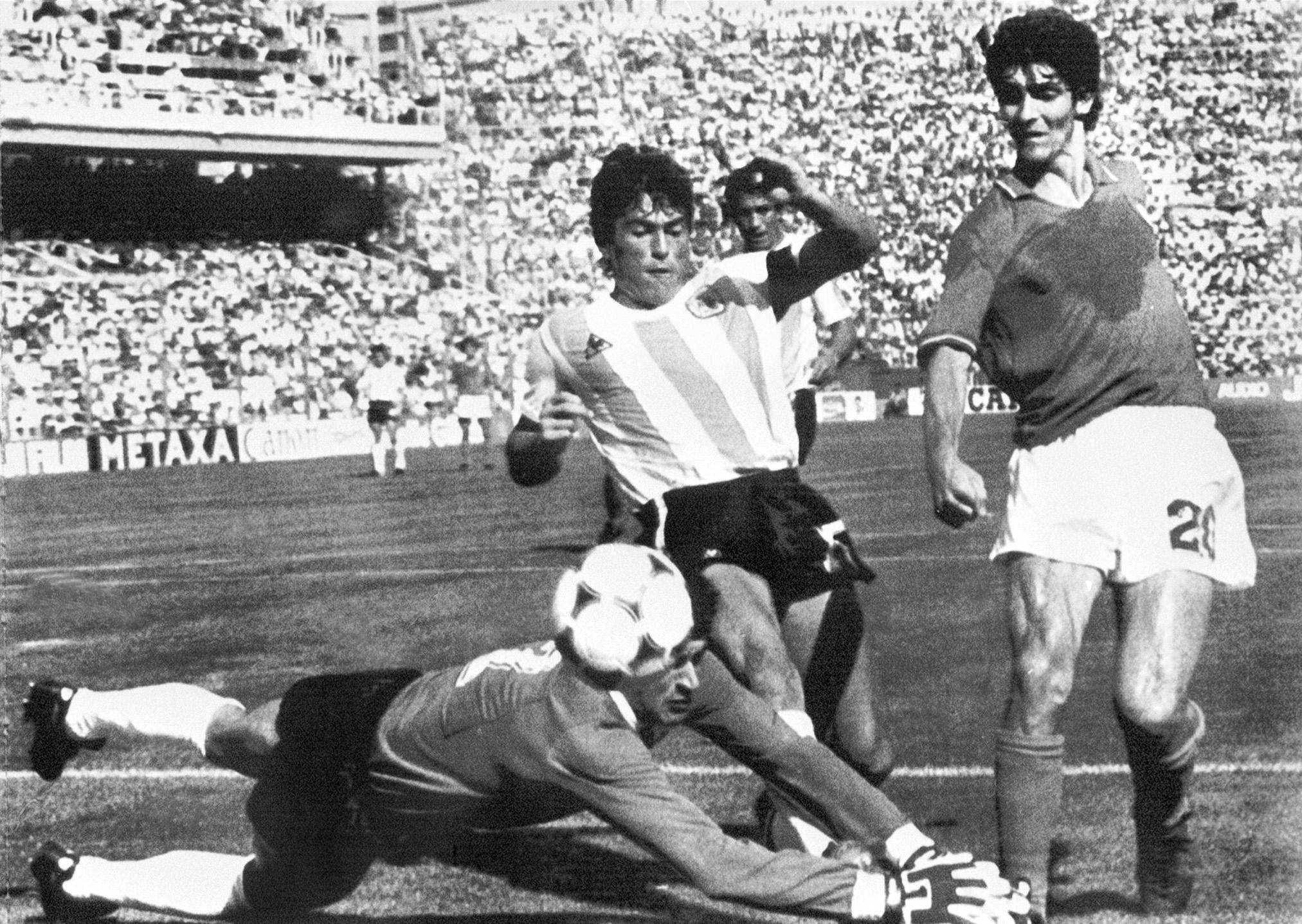
In this file photo taken on June 29, 1982 Argentinian goalkeeper Ubaldo Fillol (Bottom) and captain Daniel Passarella (L) prevent Italian striker Paolo Rossi from scoring.
- The celebrated striker’s death comes with the soccer world still in mourning for Argentina icon Diego Maradona.
The celebrated striker’s death comes with the soccer world still in mourning for Argentina icon Diego Maradona, who passed away late last month.
Italian TV channel RAI Sport, where Rossi had been working as a pundit, said on Thursday “Pablito” had died of an “incurable disease”.
“Such terribly sad news: Paolo Rossi has left us,” RAI Sport presenter Enrico Varriale tweeted.
“Unforgettable Pablito, who made all of us fall in love in that summer of 1982 and who was a precious and competent work colleague in RAI over recent years.”
Rossi’s wife, Federica Cappelletti, posted a photo of herself and her husband on Instagram along with the words “per sempre” - “forever”.
“There will never be anyone like you, unique, special ...” Cappelletti later wrote in Italian on Facebook.
The Italian football federation (FIGC) said flags would fly at half-mast at its headquarters in Rome and its technical centre in Florence.
“Pablito’s passing away is another moment of deep pain, a wound to the heart of all fans that is difficult to heal. We lose a friend and an icon of our football,” said FIGC President Gabriele Gravina.
“His name is indelibly linked to the blue shirt and his style of play inspired many strikers of future generations.”
Rossi won two Serie A titles, a European Cup and a Coppa Italia with Juventus but will be most fondly remembered for lighting up the 1982 World Cup in Spain with six goals.
His selection in the Italy squad came after a two-year ban for a match-fixing scandal and was initially criticised by pundits, who wrote him off as out of shape.
But they were left eating their words when he struck one of the World Cup’s great hat-tricks against Brazil.
Italy’s 3-2 victory in that classic encounter in the second group phase booked them a place in the semis against Poland, where Rossi again made the difference.
He sunk the Poles with a brace in a 2-0 win that fired his side into the World Cup decider against West Germany.
Rossi then scored Italy’s first in a 3-1 victory that gave them their third World Cup title and their first since 1938.
He won the Golden Boot as the top scorer and Golden Ball as the player of the tournament, a campaign regarded as one of the best individual World Cup performances of all-time.
He was also awarded the 1982 Ballon d’Or as Europe’s top footballer.
PERSONAL REDEMPTION
Born in Prato, Tuscany, Rossi played his entire club career in Italy. He was banned for three years in 1980 as part of the nation’s infamous “Totonero” match-fixing scandal but always denied any wrongdoing.
The ban was later reduced to two years, allowing him to carve out his slice of World Cup history and win “personal redemption.”
“On one hand I felt fulfilled. I said to myself, ‘you’ve made it’,” he said in a Fifa documentary in 2018.
“On the other hand, I was disappointed that all of this just ended. The World Cup was over.”
He also scored three goals at the 1978 World Cup in Argentina. With a total of nine goals, he remains Italy’s joint highest scorer at the World Cup with Roberto Baggio and Christian Vieri.
He was included in the 1986 World Cup squad but did not play and ended his playing career a year later with Verona, at the relatively young age of 30.
Italians woke on Thursday to media eulogies for one of the country’s favourite soccer sons.
Rossi was “the one who beat Zico’s Brazil, Maradona’s Argentina, Boniek’s Poland and in the final, the Germany of Rummenigge,” La Gazzetta dello Sport said on its website.
Former Italy Prime Minister Matteo Renzi tweeted: “In our hearts, forever. Farewell Pablito.”
Germany’s former World Cup winner Juergen Klinsmann tweeted: “Dear Pablito, we always remember you!”






No comments :
Post a Comment